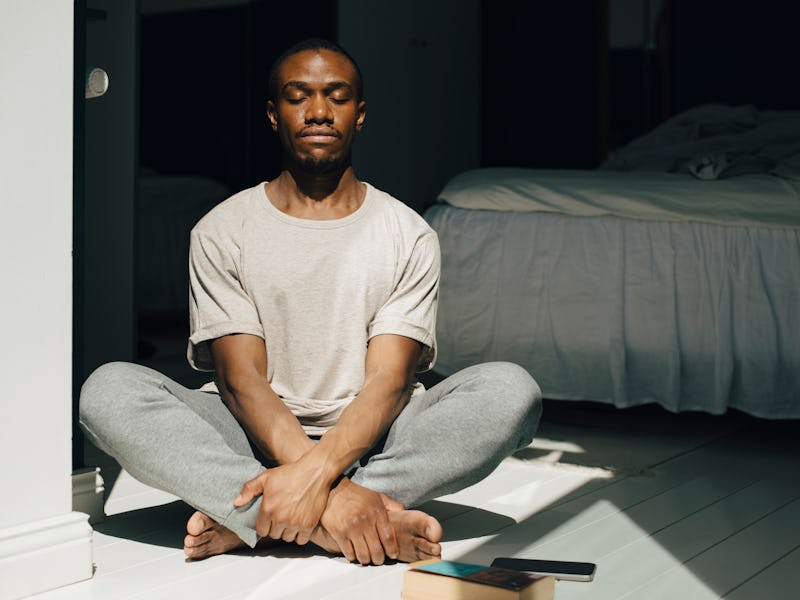Mindfulness meditation may be just as effective as anxiety medication — study
In a head-to-head comparison between mindfulness-based stress reduction and escitalopram, the results were about equal.

Mindfulness-Based Stress Reduction is equally effective as the antidepressant escitalopram — the generic version of Lexapro — in reducing anxiety, according to a study published earlier this month in JAMA Psychiatry.
The research is the first such head-to-head comparison of mindfulness-based stress reduction (MBSR) and anti-anxiety medications. It has implications for understanding mindfulness as a potential treatment for anxiety disorders.
The background— The research builds on previous work establishing mindfulness meditation as an effective tool for reducing anxiety.
While an antidepressant, escitalopram is also prescribed for anxiety, Elizabeth Hodge, lead author on the study and director of the Anxiety Disorders Research Program at Georgetown University Medical Center, tells Inverse. Hodge was the lead author of a 2013 study published in the Journal of Clinical Psychiatry that suggested mindfulness meditation had a beneficial effect on anxiety symptoms in people with Generalized Anxiety Disorder and “may also improve stress reactivity and coping as measured in a laboratory stress challenge.”
Similarly, a 2014 meta-analysis of studies evaluating the effect of meditation programs on psychological stress found that such programs “can result in small to moderate reductions of multiple negative dimensions of psychological stress.”
Researchers found that Mindfulness-Based Stress Reduction is equally effective as the antidepressant escitalopram — the generic version of Lexapro — in reducing anxiety.
Those studies were critical in establishing MBSR as something that can reduce psychological stress and anxiety.
“The next step is to find out where mindfulness meditation might fit in the flowchart of all different types of treatments for anxiety disorders,” Hodge says. “So that was a reason behind this study, to find out how it fits how it compares to the gold standard.”
If MBSR is found to be equivalent to or better than drugs like escitalopram, it could lead to insurance companies paying for MBSR courses as an anxiety treatment.
What they did— The researchers separated 276 participants with untreated anxiety disorders into two groups: one group received escitalopram, and the other attended MBSR classes. Mindfulness-based stress reduction consisted of attending weekly classes that were two and a half hours long, a day-long retreat weekend class during the fifth or sixth week of the study, and 45-minute of daily home practice exercises.
What they found— By the end of the eight-week study period, both the escitalopram and MBSR groups saw roughly a 20 percent reduction in their anxiety symptoms. Neither group experienced serious adverse events due to the respective treatments, though MBSR was better tolerated than escitalopram.
By the end of the eight-week study period, both the escitalopram and MBSR groups saw roughly a 20 percent reduction in their anxiety symptoms.
Hodge acknowledges that a daily 45-minute commitment and weekly 2.5-hour class are more time-consuming and intensive than many meditation apps would dictate. Still, based on this study and her previous research, she believes there are benefits to investing that time into an MBSR course.
“The benefit of a class is that you have an experienced instructor who can answer questions because sometimes people feel that they’re not doing it right or have some other question, and they can ask the instructor,” she says. “There’s also a benefit to having other people in the class who are asking questions, and then you can hear those answers too.”
The classes also improve adherence to the protocol; people are more likely to do the at-home exercises if they’re going to a class every week than if there’s less accountability.
What it means for the future— While the MBSR protocol may not be appealing or feasible for everyone with an anxiety disorder, the research indicates it would be an effective option for people who don’t want to take medication or have an allergy to certain medicines.
Hodge says one way to build on the research would be to “clarify what types of people do well with which types of treatment.” Then, using the information gathered from the study, they might be able to determine which demographics or psychological makeup would respond better to medication or MBSR courses.
“Another option would be to extend these findings to other diagnostic groupings, like people with depression,” she says. “The third option would be to understand if there's a type of meditation that could enhance the effect even more.”
For example, incorporating metta meditation, which focuses on cultivating loving kindness toward yourself and others, Hodge says.
“Many times, people with anxiety and depression feel a lot of judgment towards themselves. So meditation that focuses on cultivating a sense of kindness towards yourself could be really helpful, too.”